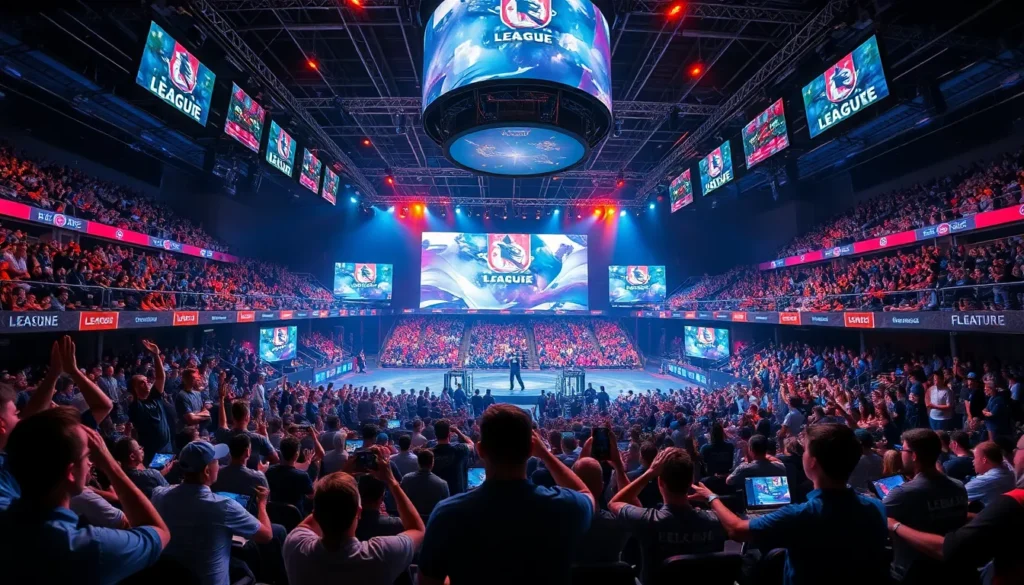In the ever-evolving world of gaming, player streaming rights are becoming the hottest topic since someone discovered that pineapple belongs on pizza. As gamers take to platforms like Twitch and YouTube, they’re not just showcasing their skills; they’re also diving into a complex web of rights and regulations that could make even the most seasoned lawyer scratch their head.
Table of Contents
ToggleOverview Of Player Streaming Rights
Player streaming rights encompass the permissions and legal aspects surrounding the broadcasting of game content on platforms like Twitch and YouTube. Gamers often encounter a complex web of agreements that influence their ability to stream gameplay. Understanding these rights shapes how content creators navigate various platforms while ensuring compliance with regulations.
Game publishers typically retain specific rights related to their intellectual property. These rights can determine whether a player can monetize their streams. Some publishers actively support content creation, providing guidelines to promote fair use. Others impose restrictions that may limit monetization opportunities for players.
Licensing agreements usually define the scope of usage for streaming content. Players should familiarize themselves with these agreements to avoid unintentional violations. Content creators often find it beneficial to review publisher policies, which clarify permissible activities regarding gameplay streaming.
In recent years, player streams have attracted attention, leading to debates about ownership and rights allocation. Streamers generate substantial revenue, prompting discussions among industry stakeholders. Major platforms recognize the economic potential of gaming content, creating partnerships that address streaming rights more effectively.
Legal cases related to player streaming rights frequently emerge, setting precedents that impact the gaming community. Courts evaluate factors such as fair use and derivative works, influencing how players can interact with their favorite games. As these cases unfold, they play a critical role in shaping future streaming regulations.
Navigating player streaming rights remains essential for anyone involved in the gaming industry. Awareness of regulations strengthens a player’s ability to engage their audience while protecting their interests.
Importance Of Player Streaming Rights

Player streaming rights hold significant importance in the gaming industry. They determine how players can share their gameplay experiences and monetize their content.
Impact On Players
Player streaming rights directly affect gamers’ ability to broadcast content. Permission from publishers can lead to various opportunities, allowing streamers to build their brands and reach larger audiences. Content creators rely on the clarity of licensing agreements to avoid unintended violations. Understanding these rights enables players to create engaging material without legal risks. Additionally, restrictions can limit options for monetization, hindering a streamer’s potential income. Streamers must stay informed on policy changes, as these can impact their creative freedom.
Impact On Teams And Leagues
Teams and leagues experience notable effects from player streaming rights. Revenue generation often links directly to player streams, influencing financial models within organizations. Many teams benefit from endorsements and sponsorships tied to their players’ streaming success. Collaboration with publishers can open additional revenue channels, yet complexities in rights management can pose challenges. Teams must navigate diverse agreements that affect collective branding and marketing strategies. Awareness of these rights allows organizations to foster stronger relationships with content creators, ensuring mutual benefit. Additionally, engaging in legal cases surrounding streaming rights helps shape long-term strategies in the competitive landscape.
Current Landscape Of Player Streaming Rights
Player streaming rights continue to evolve, reflecting changes in gaming culture and community engagement. The intersection of legality, policy, and player content generation defines this landscape.
Major Leagues and Their Policies
Major leagues implement varying policies regarding player streaming rights. The National Football League (NFL) prioritizes control over video content, restricting players from streaming game footage. In contrast, the National Basketball Association (NBA) encourages player involvement, allowing them to monetize streaming contracts. This divergence influences how athletes engage with their fan base, determining what content they can share. Each league’s stance significantly impacts revenue opportunities, shaping the strategies players adopt in their streaming endeavors.
Emerging Platforms and Technologies
Emerging platforms influence the dynamics of player streaming rights. Twitch and YouTube serve as dominant channels, but new platforms like Kick are gaining traction among gamers. With technological advancements, players access features such as augmented reality, enhancing interactions during streams. These innovations encourage deeper connections with audiences, providing opportunities for players to expand their reach. By leveraging new tech, streamers can optimize their content while navigating licensing complexities. Understanding these platforms’ specifics ensures that streamers maximize their income potential in this competitive landscape.
Challenges And Controversies
Player streaming rights face significant challenges and controversies as the gaming landscape evolves. Legal issues often arise from the complex nature of intellectual property. Game publishers commonly impose restrictions on how streamers can use their content. This creates a legal gray area for many players, especially when monetization is involved. Recent lawsuits highlight the tension between publishers and content creators. Streamers can find themselves entangled in disputes over licensing terms, leading to potential revenue losses. Clarity in these agreements remains vital for streamers to minimize legal risks.
Ethical considerations also play a critical role in player streaming rights. Questions of ownership often emerge when streamers generate substantial revenue from broadcasted content. While some publishers support content creation, others enforce strict guidelines that limit streamer freedom. The disparity in policies can contribute to a lack of transparency and trust in the industry. Streamers must navigate not only legal terrain but also the ethical implications of their work. Balancing the interests of publishers and the rights of players is essential for fostering a more equitable streaming environment.
Future Trends In Player Streaming Rights
The evolving landscape of player streaming rights indicates significant trends shaping the gaming industry. Innovations in technology and shifting regulations continue to impact streamers and game publishers alike.
Predictions And Innovations
Expect advancements in streaming technology to redefine player experiences. Augmented reality and virtual reality features can offer immersive interactions during streams. Improved integration with platforms can enhance content discovery, making it easier for streamers to engage audiences. Game publishers may adopt more flexible policies, recognizing the value of user-generated content. This shift could lead to new monetization opportunities for streamers. Platforms like Twitch and YouTube might implement enhanced tools, helping streamers maximize their earnings. As trends develop, staying informed about digital innovations becomes crucial for gamers.
Potential Regulatory Changes
Anticipate significant regulatory changes impacting player streaming rights. Governments may introduce new legislation addressing content ownership and licensing for video games. Stricter enforcement of intellectual property rights could create challenges for streamers, emphasizing the need for clear agreements. Game publishers might need to adapt their policies in response to these changes, potentially leading to more protective measures for their assets. As legal cases shape precedents, understanding emerging regulations becomes essential for streamers aiming to safeguard their interests. Ultimately, staying ahead of regulatory shifts can empower players to navigate the evolving landscape effectively.
Player streaming rights are a crucial aspect of the gaming industry that continues to evolve. As gamers navigate the complexities of licensing agreements and publisher policies, understanding these rights is essential for success. The landscape is shifting with emerging platforms and technologies that enhance viewer engagement and create new monetization opportunities.
The debates surrounding ownership and legal implications highlight the need for clarity and transparency. Streamers must balance their creative freedom with the interests of publishers to foster a more equitable environment. As the industry adapts, staying informed about changes in regulations and technological advancements will be vital for gamers looking to maximize their streaming potential.




